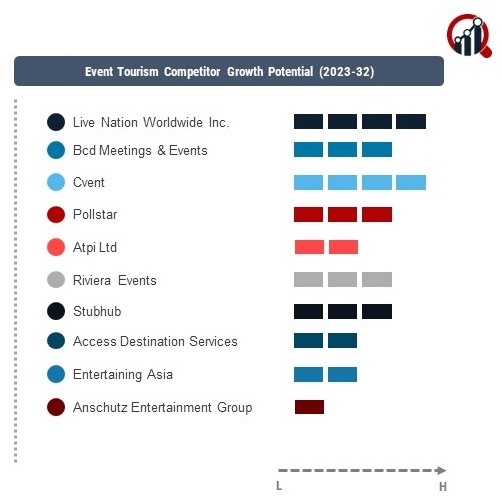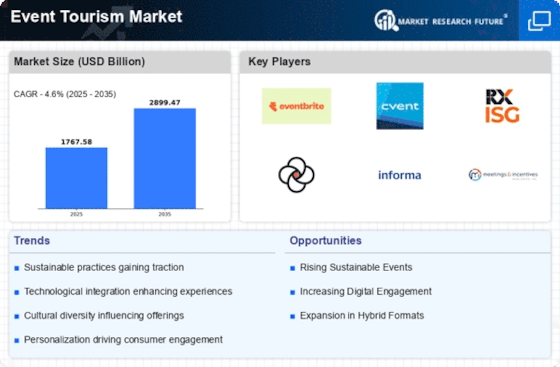Top Industry Leaders in the Event Tourism Market
 The competitive landscape of the event tourism market is characterized by a mix of established players, event organizers, and destination management companies, all contributing to the global appeal and growth of the industry. As of 2023, key players in this market include Eventbrite, Cvent, Inc., The Priceline Group Inc., BCD Group, and Live Nation Entertainment.
The competitive landscape of the event tourism market is characterized by a mix of established players, event organizers, and destination management companies, all contributing to the global appeal and growth of the industry. As of 2023, key players in this market include Eventbrite, Cvent, Inc., The Priceline Group Inc., BCD Group, and Live Nation Entertainment.
Key Players:
Live Nation Worldwide Inc.
Bcd Meetings & Events
Cvent
Pollstar
Atpi Ltd
Riviera Events
Stubhub
Access Destination Services
Entertaining Asia
Anschutz Entertainment Group
Strategies Adopted:
The event tourism market encompass technological innovation, strategic partnerships, and the creation of immersive experiences. Technological innovation involves the continuous enhancement of event management platforms, incorporation of data analytics, and the use of virtual and augmented reality to enhance attendee experiences. Strategic partnerships with hotels, airlines, and local authorities contribute to seamless event execution and attendee convenience. The creation of immersive experiences involves incorporating unique and engaging elements into events to attract a diverse audience and enhance overall event satisfaction.
Market Share Analysis:
The event tourism market include the scale and diversity of events managed, technological infrastructure, customer service, and global reach. The scale and diversity of events managed by a company contribute to its market share, with companies handling a broad range of events often having a competitive advantage. Technological infrastructure, including the robustness of event management platforms, mobile applications, and online registration systems, impacts the efficiency of event execution. Superior customer service, encompassing pre-event, on-site, and post-event support, enhances attendee satisfaction and contributes to positive brand recognition. Global reach, achieved through an extensive network of partnerships and international event planning capabilities, is crucial for catering to the global nature of event tourism.
News & Emerging Companies:
The event tourism market has seen the emergence of new companies and trends, reflecting the industry's adaptability and response to changing consumer preferences and technological advancements. Emerging companies often focus on niche markets, such as sustainable events, virtual conferences, or unique experiential offerings, to differentiate themselves in the competitive landscape. Additionally, the integration of sustainable practices, such as eco-friendly event planning and carbon offset initiatives, has gained traction among emerging players seeking to align with environmentally conscious consumers.
Industry Trends:
Industry trends in the event tourism market highlight a continued focus on hybrid event models, sustainability, and digitalization. Many companies are investing in hybrid event models that combine in-person and virtual components to cater to diverse attendee preferences and reach a broader audience. Sustainability initiatives involve the implementation of eco-friendly practices, waste reduction, and carbon footprint offsetting to align with growing environmental awareness. Digitalization efforts include the use of advanced event management software, mobile apps, and data analytics to enhance the overall event experience and streamline organizational processes.
Competitive Scenario:
The event tourism market remains dynamic, with established players adapting to the evolving needs of event organizers and emerging companies contributing to innovation. Market dynamics are influenced by factors such as technological advancements, changing consumer expectations, and the impact of global events on travel patterns. The resilience of the market is evident in its ability to navigate challenges, embrace digital transformation, and cater to the diverse demands of event tourism.
Recent Development
The event tourism market presents a competitive landscape shaped by key players employing diverse strategies to meet the evolving demands of event organizers and attendees. The emphasis on technological innovation, strategic partnerships, and sustainability underscores the industry's commitment to delivering memorable and safe experiences. As the market continues to evolve, companies that can balance innovation with adaptability are likely to maintain a competitive edge in the dynamic landscape of event tourism.











